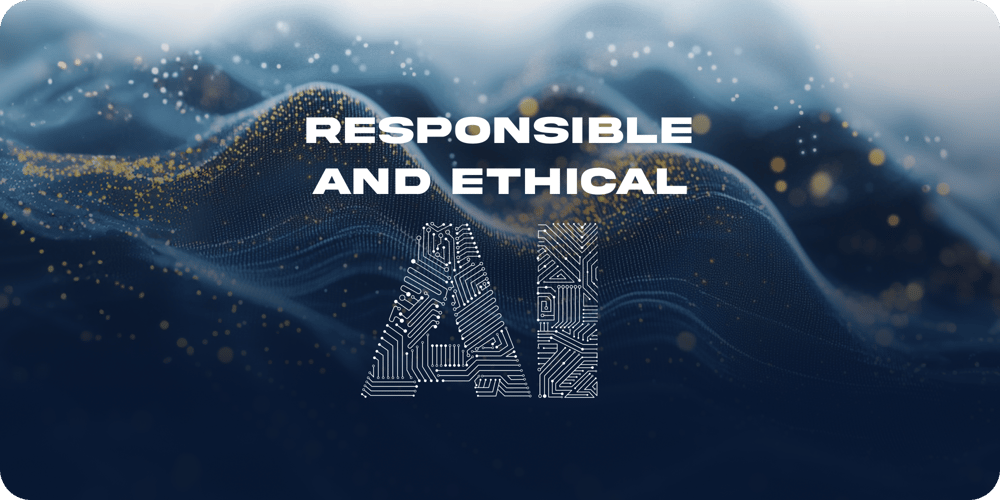Benefits of Using Responsible and Ethical AI to Write Police Report Narratives
Technology Oct 25, 2024 12:00:00 AM Anthony Tassone 4 min read

In the era of digital transformation, law enforcement agencies are turning to Artificial Intelligence (AI) to streamline workflows and improve the accuracy of critical tasks. One area where AI is beginning to have an impact is in generating police report narratives. While traditional AI tools can automate these processes, the use of responsible and ethical AI takes this a step further by ensuring that these reports are fair, unbiased, accurate, and transparent.
This blog explores the benefits of using responsible and ethical AI to write police report narratives and why this approach is vital for modern law enforcement.
1. Increased Accuracy and Consistency
Responsible AI tools are designed to minimize human error by generating clear, concise, and consistent police report narratives. By automating the report-writing process, AI can extract key details from body-worn camera (BWC) footage or officer notes and organize them in a structured, standardized format. This ensures that reports are free from inaccuracies or inconsistencies that can arise from subjective interpretations or oversight.
2. Bias Reduction
Traditional methods of report writing may unintentionally introduce bias, especially when influenced by stress, personal opinions, or implicit bias. Ethical AI systems are built to prioritize fairness by adhering to guidelines that ensure the narrative is neutral, fact-based, and devoid of discriminatory language. This is especially important when the report content could affect public perception or the outcome of legal proceedings.
3. Improved Transparency and Accountability for District Attorneys
One of the biggest concerns in law enforcement is the lack of transparency in reporting processes. Responsible AI offers a solution by providing a traceable, auditable process for how reports are generated. The system can track data sources, show how conclusions were drawn, and provide documentation on its algorithms and methodologies. This enhances accountability, allowing stakeholders to understand and trust the AI’s role in creating police narratives.
4. AI that actually decreases report writing times
Writing comprehensive and detailed police reports can be time-consuming, especially for officers who already face heavy workloads. With a nationwide police staffing crisis, it is imperative that officers’ tedious task loads be reduced. Responsible AI tools can drastically reduce the time officers spend writing reports, allowing them to focus more on community engagement and other high-priority tasks.
With TRULEO’s Field Notes, real-time interviews capture critical details instantly while the officer is on-the-go, ensuring key insights are not lost when they matter most.
This increased efficiency not only reduces administrative burdens but also improves the overall effectiveness of police departments.
5. Data Security and Privacy Protections
Ethical AI is designed with a strong emphasis on data security and privacy. When handling sensitive information like criminal reports, it’s crucial that the AI adheres to strict data protection protocols. Responsible AI tools ensure that personal data is safeguarded, access is controlled, and privacy concerns are addressed. These systems also comply with local, national, and international data protection regulations, ensuring that the handling of police report information meets the highest standards.
6. Fostering Public Trust
The public’s trust in law enforcement is often connected to perceptions of transparency, accountability, and fairness. Using responsible and ethical AI to generate police reports demonstrates a commitment to these values, which can, in turn, improve community relations. By using AI that is intentionally created to be unbiased and transparent, law enforcement agencies can enhance trust, showing the public that technology is being used in a way that maintains justice and fairness.
How does TRULEO use Responsible and Ethical AI?
TRULEO’s AI-generated report narratives are powered by Amazon Bedrock. Amazon Bedrock is a fully managed service that offers a choice of high-performing foundation models (FMs) from leading AI companies via a single API, along with a broad set of capabilities organizations need to build generative AI applications with security, privacy, and responsible AI.
Through various studies, TRULEO has determined that BWC footage alone IS NOT effective for generating report narratives.
TRULEO takes things to the next level by offering a feature called “Field Notes”. This allows an officer to speak to TRULEO right from the field via mobile phone or in car laptop while the information is still fresh, all in a secure environment. The officer can then pull up the TRULEO platform on the in-car laptop and easily review and edit notes.
Through ethical transcription, TRULEO records the spoken notes into polished text, perfect for interviews or adding detail to reports with minimal effort while redacting all civilian personal identifiable information (PII). The officer does not have to worry about mistakes. TRULEO automatically cleans up the notes, fixing grammar and ensuring the officer’s thoughts are clearly communicated. The officer’s voice is what generates the report, not AI.
The officer then has the option of enhancing the report narrative with BWC footage for AI-suggested improvements. TRULEO customers incorporate video suggestions into less than 5% of their reports, usually the longest calls for service because the other 95% of calls can easily be created with dictation. Using the officer’s own voice to generate the report is critical to assisting District Attorneys with performing their jobs effectively.
Conclusion:
As AI continues to shape the future of law enforcement, it is crucial that agencies move toward responsible and ethical AI tools, like those offered by TRULEO, particularly in the sensitive task of writing police report narratives. These tools not only streamline operations but also address core issues such as bias, transparency, accuracy, and public trust. By adopting ethical AI systems, law enforcement agencies can ensure that technology serves the cause of justice while improving effectiveness of operations.
The future of policing will not just be about embracing AI, but about implementing AI that aligns with the values of fairness, accountability, and responsibility in addition to each law enforcement agency’s own core values.

Anthony Tassone
Anthony comes from a proud military and law enforcement family, built communication intelligence platforms (COMINT), and serves as a board member of the FBI National Academy Associates (FBINAA) Foundation. He travels the country teaching trusted law enforcement leadership organizations, such as FBI LEEDS, about the practical use of artificial intelligence in policing. He received his bachelor’s degree in Computer Science from DePaul University and lives in Greenville South Carolina with his wife and four kids and is an avid bowhunter, rescue diver and triathlete.